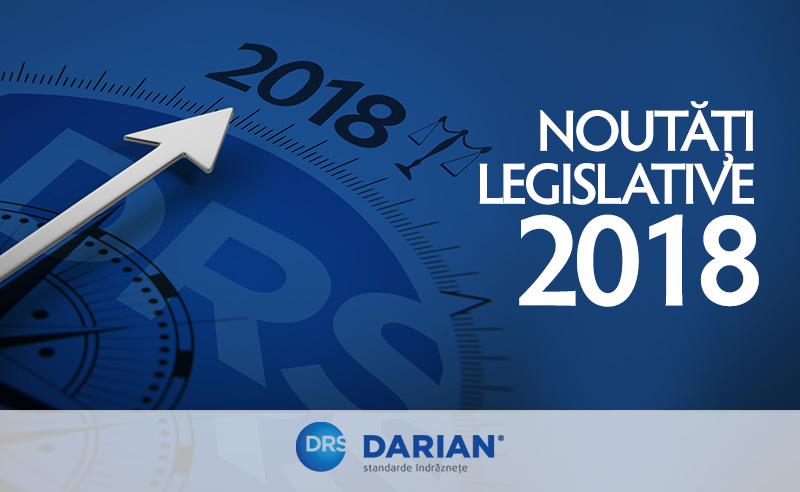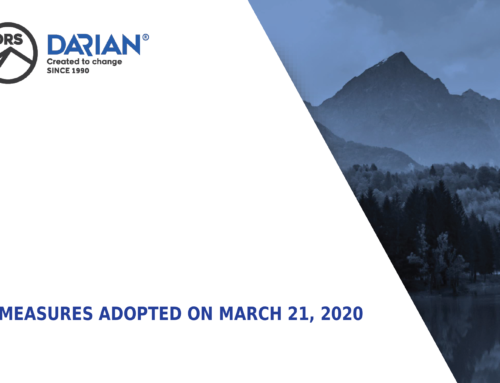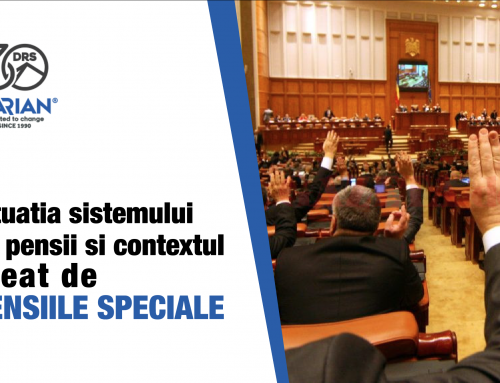We inform you that at the end of the year 2017 a series of the normative acts that brought significant amendments to the Romanian tax legislation, were published in the Official Gazette.
Next, we shall present you the most important amendments brought to the Tax Code, applicable from the beginning of the year 2018:
- In the Official Gazette no. 885/10.11.2017 the Government Emergency Ordinance no. 79/2017 regarding the amendment and addition to the Law no. 227/2015 regarding the Tax Code was published. Next we will present you the main amendments brought by this normative act:
1. Corporate tax
- The introduction of a new chapter in the Tax Code which presents the provisions of the Council Directive (EU) 2016/1164 regarding laying down rules against tax avoidance practices that directly affect the functioning of the internal market, by which the following are regulated:
- The introduction of new rules regarding the limitation of the interest and other costs equivalent to the interest from an economic standpoint – thus, the previous provisions in this regard that took into account the indebtedness degree and the level of the interest rate are no longer applicable starting with 2018;
- The introduction of various provisions that regulate the tax regime of assets transfer, tax residence and/or the economic activity carried out in a permanent registered office for which Romania losses the right to tax;
- The introduction of a new general anti-abuse rule;
- The introduction of new tax rules regarding the controlled foreign companies.
2. Income tax for micro-enterprises.
- The elimination from within the micro-enterprise definition of the provisions regarding the exception from applying the micro-enterprises regime to companies that carry out their activity in certain fields, such as banking, insurance, gambling, exploitation, consultancy and management – thus, starting with year 2018, the income tax for micro-enterprises can also be applied to these companies;
- Increasing the limitation up to which a company can qualify as income tax for micro-enterprises payer from EUR 500,000 to EUR 1,000,000;
- The repeal of the provisions according to which companies that own a share capital of at least RON 45,000 could chose to apply for this income tax regime.
3. Income tax
- The decrease of the income rate from 16% to 10%. Also, for the income from intellectual property rights, the income rate for withholding tax at source representing anticipated payment from 10% to 7% shall be decreased;
- the amendment of the level of personal deductions applicable for salary income. Specifically, the values are indexed depending on the applicable minimal wage from the 1st of January 2018 in the amount of RON 1,900.
4. Mandatory social contributions
- The amendment of the taxation of mandatory social contributions
Starting with the income related to January 2018, for the salary income, the natural persons that have the quality of employee owe social insurance contribution in the rate of 25% and social health insurance in the rate of 10% and the employees owe work insurance contribution in the rate of 2,25%. Also, employees can owe social insurance contributions in the rate of 4% in case of particular work conditions or in the rate of 8% in the case of special work conditions, depending on the case. For natural persons that obtain income from independent activities, the income associated with a legal person, income from renting goods, income from investments, income from agricultural activities, forestry, fish-farming or income from other sources, significant amendments are made to the contributions due according to the tax regulation, including over the determining the calculation base.
5. Value added tax
- the introduction of a new provision according to which the tax bodies have the right to refuse the VAT deduction if they cannot prove for a fact that the taxable person knew or should have known that the operation as a result of which the right of deduction arose was involved in value added tax fraud that appeared at the beginning or the end of the delivery/provision chain.
6. Excise taxes and other special taxes
- amendments brought to the way of calculating the means of transportation tax.
- The VAT divided payment mechanism
Law no. 275/2017 for the approval of the Government Ordinance no. 23/2017 regarding the VAT divided payment was published in the Official Gazette no. 1036/28.12.2017. In addition to the approval of the Government Ordinance no. 23/2017, Law no. 275/2017 brought a series of amendments to the VAT divided payment mechanism. The most important amendment aims at the categories of people who are obliged to apply the VAT divided payment mechanism. Specifically, the obligation to apply the VAT divided payment mechanism is applied only to taxable persons registered for VAT purpose, that is in one of the following situations:- Who register tax obligations representing outstanding VAT to the state budget, in the conditions and situations specified by the law
- Are subject to the provisions of the national law regarding the procedures of preventing insolvency.



Suntem soluția eficientă în oferirea de servicii complexe de evaluare și consultanță pentru clienții corporativi. Echipa noastră de specialiști asistă clienții în soluționarea diverselor spețe cu impact fiscal.






